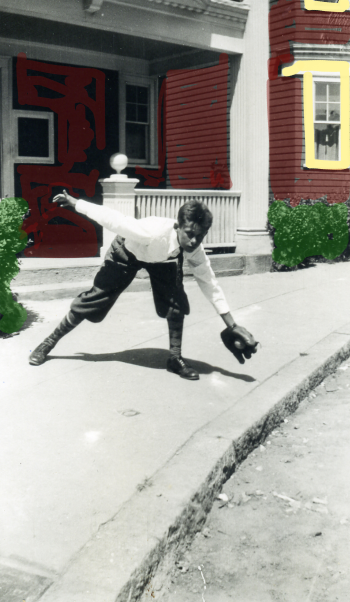.
.
photo courtesy Russell duPont

.
.
Establishing Home Plate
My father played baseball
and was a hot prospect,
so the story goes,
pursued by the Braves
until the accident that left him
with eyes that saw two of everything –
“Tough to tell which ball to swing at,” he’d say.
Approaching the field off Columbia Road,
he’d slow the car; bring it to a stop
just before the railroad bridge
that sliced across the road;
hunch over the steering wheel.
“From over there.” He’d nod
toward the far corner of the field
where home plate fit into the slab of turf –
“I hit a ball once, over this bridge.
The longest ball ever hit here.”
Almost redundant in pointing this out,
he’d shrug and quickly accelerate
from this place.
He was good, I guess.
One of those guys
who gave truth
to the cliches –
could go to his right,
dig the ball out of the dirt,
make the long throw.
But, he never came to see me play,
and I grew away from the game;
maybe, for a while, away from him.
Until last month, transfixed,
I watched the old film clips,
heard the shouts and cheers,
saw, in all those sun-weathered faces,
my father in all his youth,
saw him once again
hunched over the steering wheel
gazing into the past
as the ball left his bat,
rose in an easy arc
over the field,
over the tracks
and descended slowly
into memory.
.
by Russell Dupont
.
___
.
Three Flies Up
The lazy arc
spun through blue,
the warm sun
hung between billowing
cumulus, casual
my stride across pasture
to flick leather, snare
the orb dropped
from orbit, son
of the sun,
and wheel laughing
through a choir
of grasshoppers to claim
at a trot my turn at bat.
.
by Michael L. Newell
.
___
.
No Bottom
…………..for Philip Levine
My dad loved Arky Vaughan
the Pirate shortstop who died too soon
drowned on a fishing trip in California
the lake so deep it had no bottom
and Paul Waner
who wanted a clean 3,000th hit
not a muffed line drive
he asked the official scorer to take it back
and who
when asked if a whiskey flask
in the dugout was his answered
is it full?
if so it’s not mine—
still hit 191 triples
had a lifetime batting average of .333
neither man would own a computer
or a cell phone
or tweet
or post images on Instagram or Facebook
but they had followers
crossing the Ohio black as the River Styx
tens of thousands of coal miners and mill workers
the color of mud
the color of steel
the color of tears
while the city burned itself each summer
the fires so deep they had no bottom
.
by John Stupp
.
.
___
.
.

Russell Dupont is an artist and an author whose artwork is included in a number of public and private collections. He has published two novels, King & Train and Waiting for the Turk; two books of poetry; and two non-fiction chapbooks. His essay, “The Corner,” is included in the anthology Streets of Echoes. His work has been published in various newspapers and literary magazines. He was the founder & publisher of the literary magazine,.the albatross.
Visit his website by clicking here
.
.
___
.
.
Michael L. Newell is a retired English/Theatre teacher. He has two new books of poems, Making My Peace (cyberwit.net) and Diddley-Bop-She-Bop (Bellowing Ark Press), which features 60 pages of Newell’s jazz poetry. Click here for more cinformation about these books.
.
.
___
.
.
John Stupp’s third poetry collection Pawleys Island was published in 2017. His manuscript Summer Job won the 2017 Cathy Smith Bowers Poetry Prize and was published in August 2018. A chapbook entitled When Billy Conn Fought Fritzie Zivic was published by Red Flag Poetry in January, 2020. (From 1975-1985 he worked professionally as a mediocre jazz guitarist). He lives near Pittsburgh, Pennsylvania and can be reached via email at [email protected].
.
.
Listen to the 1969 recording of Dave Frishberg performing “Van Lingle Mungo,” which includes the names of major league baseball players
.
.
Click here for information on how to submit your work
.
.
.





























I feel lucky to be in a group of poems with John Stupp and Russell Dupont who are two writers I have admired for some time. As usual, their poems are first-rate.
These are tremendously moving, particularly Russell’s; made me think of my dad, who had a tryout with the Cubs but was a momma’s boy and didn’t want to leave home. My mom still puts his socks on for him every morning, so I guess that really was the reason he didn’t go. He also whacked a triple off of Eddie Feigner in fast-pitch softball.
Michael, as always, your endings are where so many of your poems come alive. Haven’t all boys who played ball in the park bellowed aloud, “My turn to bat” with a sh*it-eatin’ grin?
John, mentioning Arky Vaughan took me back to my dad again. His man was Ted Williams and there is no arguing with my dad that “he was the greatest hitter ever”. A couple dozen years ago, he even got to stand in left field at Fenway Park.
Thank you, gents. Great images conjured by your poems. And one last quick nugget, part of a sequence poem I wrote for my dad about 20 years ago:
“A lefty, he slashed a double down
the right-field line. Well, it would have been
a double if my dad wasn’t 67, overweight,
and sporting two titanium knees.”
It’s possible he could still make contact at 90, but with a walker, I’m not sure he’d make it to first base no matter how far the ball rolled.
Again, thank you, Russell, Michael, and John. My Sunday just got better –
Dan
Dan, I agree. I found these three poems to be deeply moving, and your post is a poem in itself. Nothing like the connection of baseball to our fathers to inspire nostalgia, creativity, laughter, sadness, and a longing for our own youth. Joe (JJM)
Spot on, Joe. I like your last point about our own longing for youth. Time to cue up Mr. Fogerty. All together… “Put me in coach, I’m ready to play today / Look at me, I can be centerfield” –